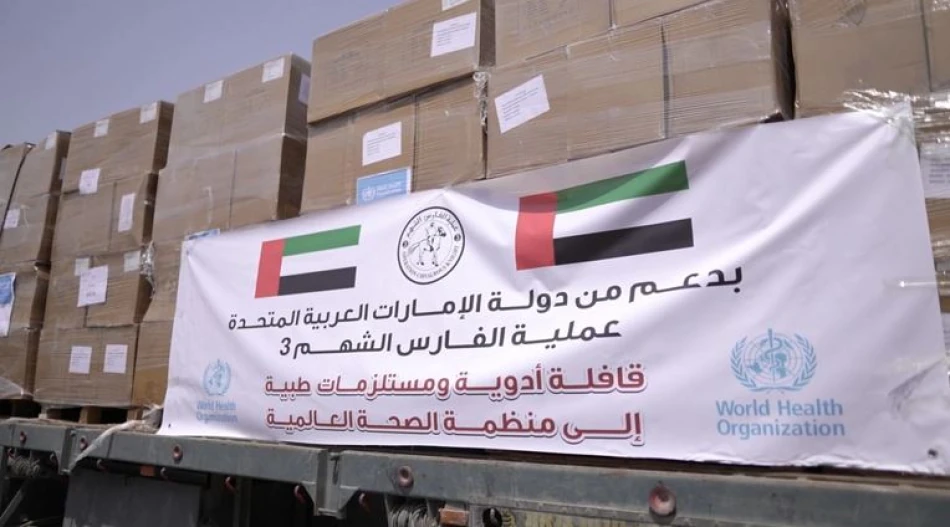
Generous Knight 3" Aids Gaza's Healthcare Sector with Vital Medical Supplies Shipment
UAE Expands Medical Lifeline to Gaza Through Operation "Noble Knight 3"
The United Arab Emirates has delivered a critical shipment of medicines and medical supplies to Gaza's healthcare sector in collaboration with the World Health Organization, marking another phase of its "Noble Knight 3" humanitarian operation. The delivery comes as Gaza's medical infrastructure faces severe shortages that threaten the collapse of essential health services across the territory.
Emergency Supplies Reach Critical Medical Centers
The Nasser Medical Complex in Khan Younis received several trucks loaded with essential pharmaceuticals and medical equipment as part of the coordinated relief effort. The facility, which serves as a major healthcare hub in southern Gaza, had been operating with critically depleted medicine stocks and facing acute shortages of basic medical supplies needed for emergency care.
According to Sherif Al-Nayrab, media director for Operation Noble Knight 3 in Gaza, the UAE continues its systematic approach to preventing the collapse of Gaza's healthcare infrastructure while alleviating the suffering of hospitals and patients throughout the territory.
International Coordination Strengthens Impact
The WHO's involvement underscores the international community's recognition that Gaza's medical crisis requires coordinated, multilateral intervention. Dr. Hiba Al-Najjar, coordinator of WHO's medical emergency teams, emphasized that the delivered shipment contains "all necessary categories of medicines that are unavailable in Gaza's health facilities."
This partnership model between Gulf states and international organizations has proven effective in previous humanitarian crises, allowing for more efficient distribution networks and reduced bureaucratic obstacles that often delay critical aid delivery.
Strategic Implications for Regional Humanitarian Policy
The UAE's sustained commitment through Operation Noble Knight 3 reflects a broader shift in Gulf state foreign policy toward humanitarian diplomacy. Unlike one-off aid packages, this systematic approach suggests long-term strategic thinking about regional stability and the UAE's role as a reliable partner in crisis management.
Ibrahim Al-Farra, Gaza's Ministry of Health official responsible for receiving international medical aid, described the UAE's contributions as "a lifeline for all patients," noting that continued assistance helps hospitals maintain operations and save lives.
Sustainable Relief Strategy
The planned continuation of supply deliveries in batches represents a more sustainable approach to humanitarian aid than emergency one-time interventions. This methodology allows healthcare facilities to plan operations more effectively while ensuring consistent availability of essential medicines.
The UAE's approach mirrors successful humanitarian strategies employed in other conflict zones, where sustained, predictable aid flows have proven more effective than sporadic large-scale deliveries in maintaining healthcare system functionality during prolonged crises.
Most Viewed News

 Sara Khaled
Sara Khaled






